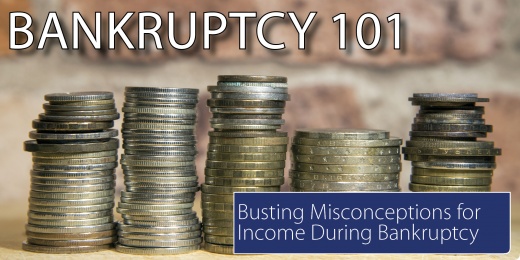Busting the misconception that bankruptcy means no more income.
Share

This article deals with common misconceptions as to how much you can earn during your bankruptcy and restrictions associated with being bankrupt.
There are common misconceptions as to how much you can earn during the period of your bankruptcy and restrictions associated with being bankrupt. This article will provide information to determine whether you will be liable for income contributions (if at all) and bust the myth that bankruptcy will have a severe impact on your income and livelihood.
How much you can earn
During bankruptcy, income retains its ordinary meaning and includes, among others, Centrelink benefits and loans from related parties.[1]
There is currently no limit to how much you can earn during your bankruptcy. However, should your after-tax income exceed the Australian Financial Security Authority’s prescribed Annual Income Threshold Amount (“AITA”), you will be required to make compulsory contributions towards your administration. The AITA applicable to you is calculated on the amount of dependants you have.
Dependants
For an individual to be considered your dependant, they must:
- Reside with you;
- Be economically dependent on you; and
- Not earn income greater than the current income limit. [2]
The current income limit for how much a dependant can earn during the relevant contribution assessment period (“CAP”) is $3,649 before tax (updated quarterly).
Income Assessment
Your Trustee will conduct an annual income assessment of the income you are likely to earn and income that you have actually earned during relevant your CAP.[3] Your CAP will begin from either the day you file your Statement of Affairs with AFSA or the date you became bankrupt by a Court Order.
You must provide evidence of your income earned for the previous CAP together with your expected income for the following CAP no more than 21 days after the conclusion of your current CAP.[4]
Failure to provide evidence of your income can result in your Trustee lodging an objection to your automatic discharge from bankruptcy – therefore extending your bankruptcy for five or eight years.[5]
Income Contributions
Should your Trustee assess you as having earned or likely to earn above your applicable AITA, you will be required to make compulsory income contributions towards your administration.[6]
The total amount you will be liable for is calculated as follows: [7]
Assessed Income – AITA
2
Failure to pay your income contributions can also result in your Trustee lodging an objection to your automatic discharge from bankruptcy[8] or the issuing of a Garnishee Notice to your employer for payment of the outstanding contributions.[9]
You will continue to be liable for contributions even if you have been automatically discharged from bankruptcy.[10]
Deductions/Hardship Applications
Your income contributions can be reduced by any amount you have paid or are likely to pay for income tax or child support payments.[11] Additionally, your income contributions can be reduced by your business expenses should you be a sole trader (you will be required to provide documentary evidence to support the business expenses deductions you claim and they must be directly attributable to the earning of your income). Business expenses will be assessed by your Trustee as to whether they are allowable deductions for income contribution purposes.
Should payment of your income contributions cause you hardship, you are able to lodge a hardship application with your Trustee if you have the following:
- Medical expenses for yourself or a dependant;
- Child care expenses necessary for work;
- High rent expenses with no alternatives;
- Significant travelling expenses for work; and
- Loss of financial contributions made by a third party.[12]
In the interim, if you have any questions, or your clients are experiencing financial distress, please contact Sofia Pichardo or Neil McLean on (03) 9670 8700.
[1] Bankruptcy Act 1966 (Cth) s 139L.[2] Ibid s 139K.[3] Ibid s 139W.[4] Ibid s 139U.[5] Ibid s 149D(1)(d).[6] Ibid s 139P.[7] Ibid s 139S.[8] Ibid s 139D(f).[9] Ibid s 139ZL.[10] Ibid s 139R.[11] Ibid s 139N.[12] Ibid s 139T.






